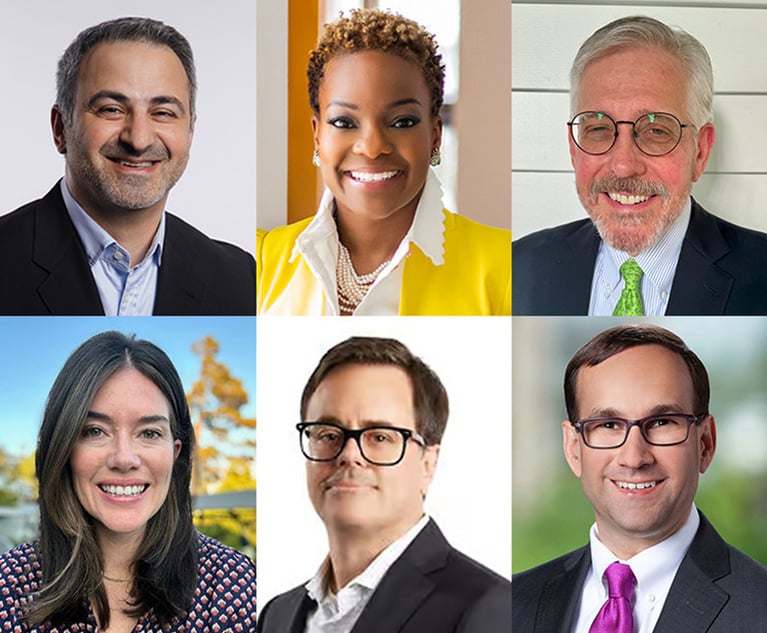 Gantry cranes and containers stand at the Yangshan Deepwater Port, operated by Shanghai International Port Group Co. Photo: Qilai Shen/Bloomberg
Gantry cranes and containers stand at the Yangshan Deepwater Port, operated by Shanghai International Port Group Co. Photo: Qilai Shen/BloombergTips on China Tariff Exclusion Requests as Deadline Approaches
“Now’s the time to be ramping up your effort” to obtain exclusions, said Jason Waite, a partner at Alston & Bird who leads the firm’s international trade and regulatory group in Washington, D.C. But he warned that there are “still a lot of unknowns.”
August 16, 2019 at 01:48 PM
6 minute read
With the deadline for submitting tariff exclusion requests for $200 billion worth of Chinese imports fast approaching, trade lawyers say they have been busy helping U.S. companies navigate the opaque request process.
Exemption requests for products covered under Section 301 List 3 tariffs on China, which casts a net over a wide range of goods, from food and furniture to tools and electronics, are due Sept. 30. The Office of the U.S. Trade Representative has provided some guidance by stating, for instance, that requests should address whether the import in question can be sourced from outside China.
“Now’s the time to be ramping up your effort” to obtain exclusions, said Jason Waite, a partner at Alston & Bird who leads the firm’s international trade and regulatory group in Washington, D.C. But he warned that there are “still a lot of unknowns.”
“It remains to be seen what sways [the USTR], but this is the process,” he added.
Waite was hopeful that the USTR will do a better job developing and clarifying its methodology for exemption requests as the tariff lists expand and more requests roll in—the first round of List 4 tariffs on $300 billion of Chinese imports is slated to take effect Sept. 1. Tariffs on a second batch of goods are scheduled for Dec. 15.
“It’s one thing to be stingy about exclusions when you’re talking about $50 billion worth of imports of a certain type, but as this list becomes almost everything, I think it’s in the interest of policy and the USTR to have a broad-based analysis of appropriate exclusions,” he said.
At the moment, companies would be wise to avoid basing their exemption petition on the assertion that it will cost too much to make a product on the tariff list in the U.S. or anywhere else outside China, according to Adams Lee, an international trade lawyer at Harris Bricken in Seattle.
“We try to tell them [clients] that the USTR is trying to identify products that really can only be sourced from China,” he said. “It then goes to the issue of trying to define the product that you’re asking to be excluded.”
Define the product too broadly and companies risk undermining their argument that the good cannot be made beyond China’s borders, according to Lee. He said a detailed definition of the product helps bolster the assertion that it’s so unique that it can only continue to be made in China.
“The flip side of the product description issue is if you define it too narrowly the danger is customs officials aren’t going to be able to recognize the product at the port and administer the exclusion,” Lee noted. “You also can’t define it by its end use. You can’t say, ‘This is a screw to be used in this unique application.’ Customs is only going to see a screw.”
Waite added that the “big thing to think through is, ‘Do we have a case on the merits?’”
“The core element of that has been the lack of availability of the product in the United States and, secondarily, outside of China,” he said. “That’s the thing that deserved to be analyzed from a few different angles. What is the product? What’s unique about the product? Where is it available and why might it not be available elsewhere?”
Companies also should be prepared for a long wait—six months to a year—before they learn whether their requests have been granted or denied.
“The bad news is that the process will take a long time to resolve itself,” Waite said. “The good news is if you get your exclusion it’s retroactive. But that’s often very little solace to companies whose cash flow is crimped by the tariffs.”
One company that is feeling a tariff crimp, JSW Steel USA Inc., which initially applauded the Trump administration’s aggressive trade tactics, has challenged the Commerce Department’s denial of its request to be excluded from a 25% tariff under Section 232 on steel imported from Mexico and India.
The Baytown, Texas-based company argues in a complaint filed July 30 at the U.S. Court of International Trade that the steel in question “is not available in the U.S. market in the quality and quantities that JSW USA requires.”
“Despite the foregoing, the Department of Commerce ignored the record evidence establishing that the steel slab JSW USA imports is not presently available in the U.S. market, and instead issued the same boilerplate denial to each and every one of JSW USA’s exclusion requests. As a result, JSW USA has paid tens-of-millions of dollars in tariffs from which it should have been exempted,” the company writes in its complaint.
Devin Sikes, an international trade lawyer at Akin Gump Strauss Hauer & Feld in Washington, D.C., noted that because the exclusion request processes for Section 232 and 301 tariffs are structurally different, there shouldn’t be any spillover effects from the JSW case.
“But big picture, this is a case of first impression,” he said. “The court will first have to grapple with whether it has jurisdiction over the dispute. If it does, it will get into the merits for the first time ever for whether the Commerce Department’s decision comports with accepted administrative law principles.”
Read More:
This content has been archived. It is available through our partners, LexisNexis® and Bloomberg Law.
To view this content, please continue to their sites.
Not a Lexis Subscriber?
Subscribe Now
Not a Bloomberg Law Subscriber?
Subscribe Now
NOT FOR REPRINT
© 2025 ALM Global, LLC, All Rights Reserved. Request academic re-use from www.copyright.com. All other uses, submit a request to [email protected]. For more information visit Asset & Logo Licensing.
You Might Like
View All
'Be Comfortable Being Uncomfortable': Pearls of Wisdom From 2024 GC Q&As



Kraft Heinz Hires GC of Industrial Manufacturer as Legal Chief
Trending Stories
Who Got The Work
Michael G. Bongiorno, Andrew Scott Dulberg and Elizabeth E. Driscoll from Wilmer Cutler Pickering Hale and Dorr have stepped in to represent Symbotic Inc., an A.I.-enabled technology platform that focuses on increasing supply chain efficiency, and other defendants in a pending shareholder derivative lawsuit. The case, filed Oct. 2 in Massachusetts District Court by the Brown Law Firm on behalf of Stephen Austen, accuses certain officers and directors of misleading investors in regard to Symbotic's potential for margin growth by failing to disclose that the company was not equipped to timely deploy its systems or manage expenses through project delays. The case, assigned to U.S. District Judge Nathaniel M. Gorton, is 1:24-cv-12522, Austen v. Cohen et al.
Who Got The Work
Edmund Polubinski and Marie Killmond of Davis Polk & Wardwell have entered appearances for data platform software development company MongoDB and other defendants in a pending shareholder derivative lawsuit. The action, filed Oct. 7 in New York Southern District Court by the Brown Law Firm, accuses the company's directors and/or officers of falsely expressing confidence in the company’s restructuring of its sales incentive plan and downplaying the severity of decreases in its upfront commitments. The case is 1:24-cv-07594, Roy v. Ittycheria et al.
Who Got The Work
Amy O. Bruchs and Kurt F. Ellison of Michael Best & Friedrich have entered appearances for Epic Systems Corp. in a pending employment discrimination lawsuit. The suit was filed Sept. 7 in Wisconsin Western District Court by Levine Eisberner LLC and Siri & Glimstad on behalf of a project manager who claims that he was wrongfully terminated after applying for a religious exemption to the defendant's COVID-19 vaccine mandate. The case, assigned to U.S. Magistrate Judge Anita Marie Boor, is 3:24-cv-00630, Secker, Nathan v. Epic Systems Corporation.
Who Got The Work
David X. Sullivan, Thomas J. Finn and Gregory A. Hall from McCarter & English have entered appearances for Sunrun Installation Services in a pending civil rights lawsuit. The complaint was filed Sept. 4 in Connecticut District Court by attorney Robert M. Berke on behalf of former employee George Edward Steins, who was arrested and charged with employing an unregistered home improvement salesperson. The complaint alleges that had Sunrun informed the Connecticut Department of Consumer Protection that the plaintiff's employment had ended in 2017 and that he no longer held Sunrun's home improvement contractor license, he would not have been hit with charges, which were dismissed in May 2024. The case, assigned to U.S. District Judge Jeffrey A. Meyer, is 3:24-cv-01423, Steins v. Sunrun, Inc. et al.
Who Got The Work
Greenberg Traurig shareholder Joshua L. Raskin has entered an appearance for boohoo.com UK Ltd. in a pending patent infringement lawsuit. The suit, filed Sept. 3 in Texas Eastern District Court by Rozier Hardt McDonough on behalf of Alto Dynamics, asserts five patents related to an online shopping platform. The case, assigned to U.S. District Judge Rodney Gilstrap, is 2:24-cv-00719, Alto Dynamics, LLC v. boohoo.com UK Limited.
Featured Firms
Law Offices of Gary Martin Hays & Associates, P.C.
(470) 294-1674
Law Offices of Mark E. Salomone
(857) 444-6468
Smith & Hassler
(713) 739-1250






